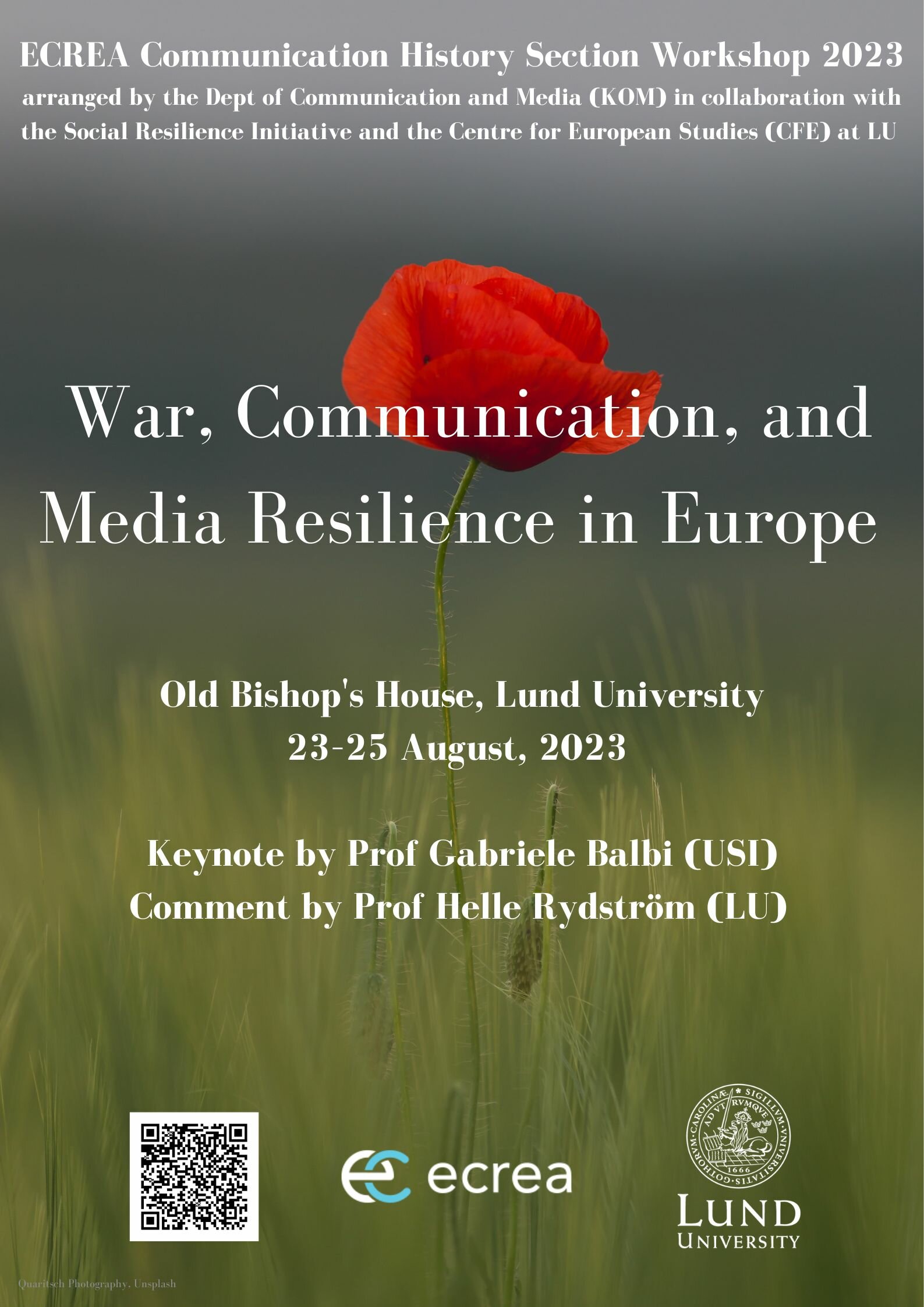Programme
ECREA Communication History Section Workshop: ‘War, Communication, and Media Resilience in Europe’, 23-25 August 2023, Lund, Sweden
Workshop programme
The Old Bishop’s House
Biskopsgatan 1
223 62 Lund
Wednesday 23 August
15.00–16.00 Registration
16.00–16.15 Welcome from organisers and the COHECREA board
16.15–17.30 Keynote: Gabriele Balbi (Università della Svizzera Italiana):
”Media at/after/as War: Historical and Theoretical Perspectives”
Chair: Marie Cronqvist (Lund University)
17.45–18.15 Helle Rydström (Lund University): “What is social resilience?”
Short intervention to spur discussion
Chair: Martin Lundqvist (Lund University)
18.15–20.00 Light reception buffet
Thursday 24 August
08.30–10.00 Session I: Journalists and war correspondents
Stephanie Seul (University of Bremen): “Female resilience in a maledominated
field: “The Times” war correspondent Avis Waterman on the
Italian front during the First World War”
Emil Eiby Seidenfaden (University of Copenhagen): “‘A Rational
Exploitation of News’: The Legacies of Scandinavian Exile News-Services
1940-1945”
Jacinto Godinho (NOVA University of Lisbon): “RTP and the colonial
war (un)coverage (1961-1974)”
Elisabeth Fondren (St. John’s University): “‘To be Alive at the End of
Such a War was Indeed a Miracle’: Theorizing Standpoint Theory for
Working-Class War Reporters and Uncovering the Eyewitness News of
World War I Photo Correspondent Percy Brown (1914-1920)”
Chair: Sune Bechmann Pedersen (Stockholm University)
10.00–10.15 Coffee break
10.15–11.45 Session II & III (parallel sessions)
Session II: Anti-war resistance
Carla Baptista (NOVA University of Lisbon): “Against war, Against
colonialism: An analysis of the clandestine newspaper Boletim Anticolonial
(BAC)”
Beata Rudy (University of Silesia): “The Anti-war Stance in the German
Social Democratic media of 1914-1918 on the Example of the Journal ‚Der
Wahre Jacob’”
Mario Kikas (Nord University): The media change in the "popular frontist
cultural debates" in the 1930s
Chair: Ulrika Holgersson (Lund University)
Session III: Visuality and propaganda
Rita Luis (NOVA-University): “Liberation struggle in Lusophone Africa
in the Metropolitan Portuguese television (1961-1974)”
Scott Keefer (Bournemouth University): “The Mood of 1914: A Lost
Film?”
Klara Arnberg (Stockholm University): “Wartime segments: identifying
classed and gendered audiences during scarcity, Sweden 1939-1945”
Emil Stjernholm (Lund University): “Visual Propaganda Tactics in
Neutral Sweden, 1939–1945”
Chair: Eskil Vesterlund (Lund University)
11.45–12.30 COHECREA Section Meeting
12.30–13.30 Lunch
13.30–15.00 Session IV: Warchives and memory
Hans-Ulrich Wagner (Leibniz Institute for Media Research): “Media
resilience? Towards a user-oriented framework for digital interactive
memory and what we can learn from the analysis of users‘ comments on the
German Instagram project ‚ichbinsophiescholl‘ (2021/22)”
Eva Tamara Asboth (Austrian Academy of Sciences) & Michaela
Griesbeck (University of Vienna): “‘Children of the Balkan Wars’—The
impact of childhood war memories on the responses and resistance towards
war related media content in Bosnia-Herzegovina, Kosovo, Montenegro,
and Serbia”
Allan Burnett (Lund University): “Subverting a tyranny yet to come?
Aspirations and limitations in the making of The World at War c. 1971-
1975”
Hanna-Sophie Ruess (University of Augsburg), Susanne Kinnebrock
(University of Augsburg) & Christian Schwarzenegger (University of
Bremen): “Weaponizing Collective Trauma - Iconography and Narratives
of Far-right Conspiracy Myths in Interwar Germany”
Chair: Valérie Schafer (University of Luxembourg)
15.00–15.30 Coffee break
15.30–17.00 Session V: Disinformation, propaganda, and censorship
Valentina Shapovalova (University of Copenhagen): “Resisting reality:
Russian disinformation and the full-scale invasion of Ukraine”
Troels Solgaard Andersen (Aarhus University): “Advantages of Doing
the Dirty Job. Media Censorship in Denmark during the Second World
War”
Ina Emuziene (National Museum of Lithuania): “Communicating
“Soviet dream” – Soviet propaganda to the Lithuanian diaspora”
Arne Segelke (University of Greifswald): “A rather distant war - The First
World War as a media event in Scandinavia”
Chair: Allan Burnett (Lund University)
18.00–19.00 Pre-dinner drink
19.00–21.00 Dinner banquet
Friday 25 August
9.00–10.30 Session VI: Resilient infrastructures
Sebastian Graf (Lund University): “Establishing online crowds:
Ukrainian virtual museums at war”
Valérie Schafer (University of Luxembourg): “Archiving the Web during
unforeseen events (terrorist attacks, war...)”
Martin Fomasi (Università della Svizzera Italiana): “Post Protocol War
at CERN: persistence of information retrieval systems, formats, and lost
conflicts of the Web”
Staffan Ericsson & Lars Lundgren (Södertörn University): “Monitoring
the Baltic Sea: Sonar, Television, and the Submarine Crisis”
Chair: Christian Schwarzenegger (University of Bremen)
10.30–10.45 Coffee break
10.45–12.00 Roundtable ‘War, Communication, and Media Resilience in Europe’
Christian Schwarzenegger, Valérie Schafer, Marie Cronqvist and Martin
Lundqvist
Chair: Rosanna Farbøl (Lund University)
12.00 Lunch and goodbye

